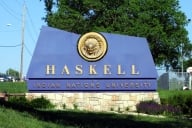You have /5 articles left.
Sign up for a free account or log in.
Deidra Faye Jackson earned her Ph.D. in Higher Education from the University of Mississippi in Oxford, where she teaches in the departments of Writing and Rhetoric and Higher Education. You can find her on Twitter at @DeidraJackson11.
It took me a few days, but I now see the connection between director Jordan Peele’s movie, Us, and graduate students and early career researchers in academia. So, without revealing anything to anyone still planning to see this engaging horror flick, here’s the film’s implicit message:
Regularly evaluate yourself! Don’t be oblivious to any truths that your own self-assessments might reveal.
For our own sakes, we need to regularly embrace self-evaluations and not avoid the deep introspection that comes with them. As witnessed in Us and other psychologically unnerving features, the monsters tend to emerge when we fail to confront the inner voice that tells us something is amiss.
In academia, we constantly engage in evaluations and outcomes measurement, appraising the efficacy of our lectures, meetings, workshops, conferences, and other events (heck, even the school-sponsored catered lunch we eat) to help us better plan for the next. Such assessments, when employed effectively, operate as proactive instruments that enable us to look ahead and repeat what worked well and avoid or modify what didn’t.
Though we sometimes grouse about having to submit yet another evaluation, many of us still do. We should be just as diligent in regularly ticking off boxes to appraise our functioning selves, to replicate (and improve on) what worked well or modify or avoid what didn’t.
Amid the pandemonium of our academic lives, self-evaluations should give us opportunities to pause and contemplate our performance, as well as to reflect on, develop, and laud our accomplishments. Interrogating ourselves doesn’t always have to mean shining harsh klieg lights on our “weaknesses” or perceived failures; there’s also room to highlight our own noteworthy strengths and qualities, great and small. This is a fact of which I frequently have to remind myself.
Who willingly wants to recall their shortcomings? Not me.
And sometimes when you know you need to look inward more often, you tend to avoid all the mirrors you’ve been ignoring because you may not want to be reminded of what they reveal.
Or, put another way, constantly relying on an incorrect appraisal of our abilities compared to others – which some regard as the more accurate definition of imposter syndrome – won’t instill in us the courage that we may need to defeat any metaphorical beasts that may hinder our progress.
Let’s engage in some regular self-analysis, lest the monsters emerge, if we don’t acknowledge some truths, whatever they may be.
There’s no shortage of reasons to at times feel as though you must “fake it till you make it”; scholarly expectations from one’s practice, not to mention obligations to students, parents (students’ and, perhaps, one’s own), peers, administrators, mentors, benefactors, editors, and others, exponentially heighten awareness of – and, sometimes, doubts about – our skills and abilities.
Having the competency to guide student learners, to impart and amplify knowledge in a chosen field, and to collaborate with other researchers toward a common goal are among the more edifying aspects of academia. However, for graduate students and others, academe can routinely be unforgiving when you’re juggling numerous demands and performing under the constant gaze of people, whose judgments are highly regarded.
Individual self-evaluations need not be complicated and should fit individual needs. As you think about it, you might randomly ask yourself: What worked well? What could I do even better? In what ways can I improve or enhance my skills and abilities? What can I focus on next time? How can I use these self-assessments to progress?
What might we be refusing to see when we fail to assess ourselves by shining the light inward?
Do you regularly engage in self-evaluation? What questions do you ask yourself? What advice do you have for grad students and other early career researchers when it comes to self-assessments? Tell us in the comments or on Twitter!
[Photo by Andre Mouton on Unsplash and under the Creative Commons license.]








